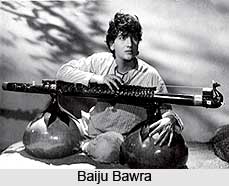 Baiju Bawra is one of the most well known Indian Musicians of all time. However, since he belonged to older centuries, not much information can be obtained about his life. Even his full name is not known. Nayaka and Bawra were the epithets that came to be attached to his name. The epithet Nayaka was earned by Baiju on account of his excellence as a musician. The other epithet Bawra means `mad` or `eccentric`. This was earned by him because he was so engrossed in music and devotional life that he had become rather unmindful of the usual conventions of his day and unmindful of his dress or comfort. He moved about as a religious mendicant.
Baiju Bawra is one of the most well known Indian Musicians of all time. However, since he belonged to older centuries, not much information can be obtained about his life. Even his full name is not known. Nayaka and Bawra were the epithets that came to be attached to his name. The epithet Nayaka was earned by Baiju on account of his excellence as a musician. The other epithet Bawra means `mad` or `eccentric`. This was earned by him because he was so engrossed in music and devotional life that he had become rather unmindful of the usual conventions of his day and unmindful of his dress or comfort. He moved about as a religious mendicant.
Some scholars hold that Baiju was from the western part of India. The following account has been furnished. Baiju was born in village Champaner in the province of Gujarat in a Brahmin family. His real name was Baijandtha Misra. His father died when Baiju was still a child. His mother was a very pious woman and a devout worshipper of Lord Krishna. She used to frequently recite to the young child aspects of life of Lord Krishna. As a result, Baiju came to acquire a religious bent and a particular devotion for Lord Krishna right from his childhood. After some years, Baiju`s mother, forsaking all her worldly possessions set out for Vrindavan to spend the rest of her life in the service of Bhagavan Krishna. Baiju accompanied his mother. After a long trek towards Vrindavan, Baiju and his mother felt very tired and in order to get some rest decided to make a halt on the bank of the Yamuna River. This place was close to the Asrama (hermitage) of Svami Haridasa. A little while later Svami Haridasa, while returning to his Asrama after a bath in the river, caught sight of Baiju. On account of his supernatural insight he immediately recognized that the boy had an extraordinary talent in music. He took Baiju under his tutelage while Baiju`s mother became engrossed in her religious pursuits and in the service of Bhagavan Krishna.
Baiju began to make great progress in music under the guidance of Svami Haridasa. One day while Baiju was singing Kedara Raagini, he heard the cry of a newly born baby. At a place nearby he saw a beautiful newly born child crying alone. The child`s identity not being known, Baiju picked up the child and began to rear him up in his Asrama. Baiju named him Gopala. As he grew up Gopala began to learn music from Baiju. Some years later, at the request of Raja Singh, the landlord of Chanderi, Baiju moved over to Chanderi along with his pupil Gopala. Here two girls by the names of Kala and Prabha became the pupils of Baiju. Prabha was married to Gopala. She bore a daughter, Mira, to Gopala. Baiju`s restricted world now centered around Mira.
At this time Baiju received an invitation from Raja Man Singh Tomar to come to Gwalior on the occasion of his marriage with Mrganayani. Raja Man Singh and Rani Mrganayani were greatly impressed by the art of Baiju. Mrganayani expressed a great desire to learn music from Baiju. Baiju became her teacher and began to live in Gwalior. Man Singh felt enchanted by Baiju`s singing and held him in high esteem. Amongst the chief singers of Gwalior of that time was one Vijaya Jangama. He was jealous of Baiju and was always trying to show him down. This stimulated Baiju to invent a new style of singing called Hori-Gayaki. Later, Baiju invented other Raagas like Gujari Todi, Mrgarahjani todi, Mangala Gujari etc. The Dhamaratala was also invented by Baiju together with Gopala.
In Gwalior Baiju was attaining greater and greater heights. In order to create a lasting monument to the gifts of Baiju, Raja Man Singh and his wife Mrganayani established a music school called `Gwalior Sangita Vidyapitha.` The Hori Gayaki and Dhamaratala invented by Baiju were given a respectable place in the curriculum of this school. At about this time, Baiju came to know about Gopala`s betrayal and ungratefulness. Gopala had been lured by the prospects of name and fame in Kashmir and secretly left Baiju to go there. He was gravely hit by this. He found it particularly difficult to bear the absence of Mira whom he loved so dearly. As a result of this shock he lost his mental balance. From then on he began to be referred to as Baiju Bawra (meaning Baiju the mad).




















